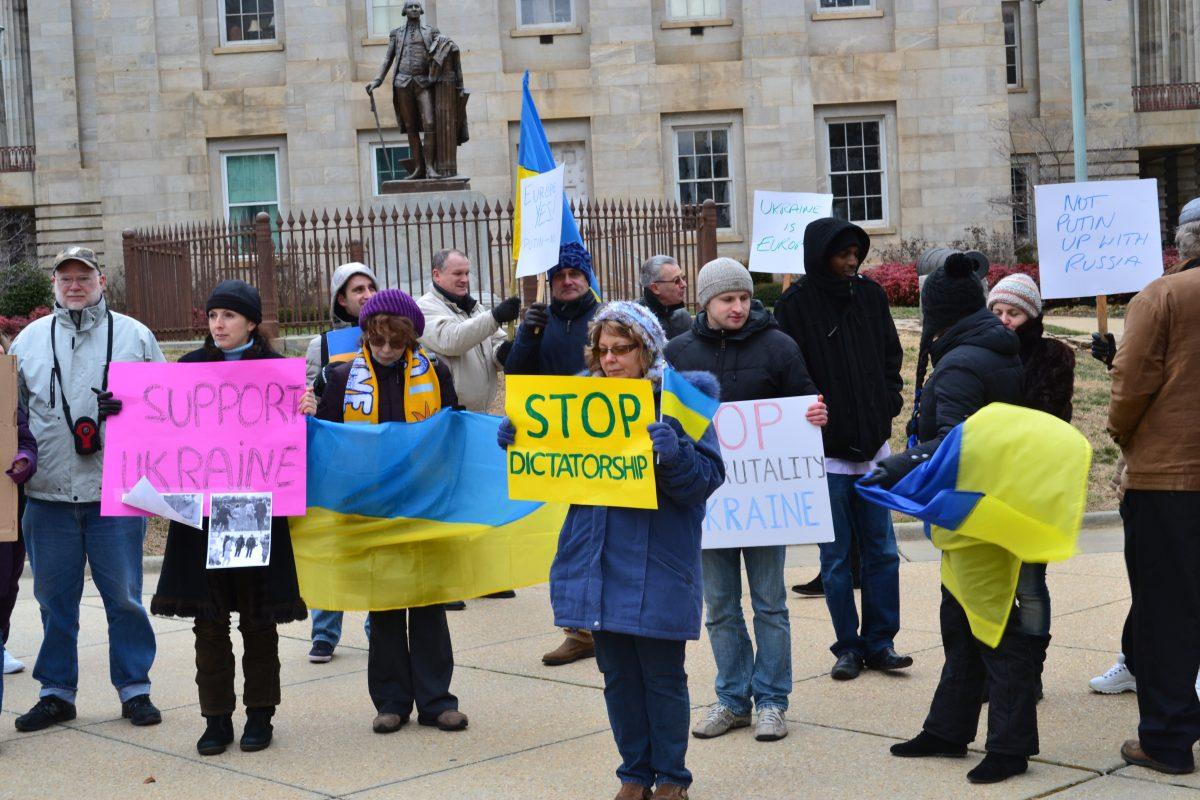About 45 people gathered outside the State Capital in protest of the ongoing Ukrainian crisis Saturday afternoon.
Vasyl Shymonyak, president of the Ukrainian Association of North Carolina said the protest was not just to show support for the Ukrainian people, but to raise awareness of the state of Ukrainian politics and collect funds to support the Ukrainian people.
“We wanted the public to know what is going on in Ukraine so that they will pressure authorities to take action to make sanctions against members of the ruling Ukrainian government,” Shymonyak said.
According to Oleh Wolowyny, a retired professor from UNC-Chapel Hill who continues to work as a research fellow, Ukrainian Americans are frustrated with how the Ukrainian people have been treated in their homeland and hope the United States will place economic and legal sanctions on members of the Ukrainian government to deter them from their current course of action.
The Euromaidan, the name given to the wave of ongoing demonstrations, which first began in November, originated when Ukrainians first demanded integration with the European Union. However, since then, the demands of the Ukrainian protesters have evolved to include the resignation of President Viktor Yanukovych and his government, and for the country to hold new elections.
Wolowyny said the Ukrainian spirit represented the “total societal rebellion against the current government.”
According to Wolowyny, the U.S. government has already seized the VISAs of certain Ukrainian officials, but he said he hopes that Congress will act to do more.
Wolowyny said he hopes the U.S. realizes the strategic importance of Ukraine in the region, and that if Ukraine were to fall, it would likely allow Russia to gain even more dominance in the region and a bigger role on the world stage.
Andriy Shymonyak, a junior in history and political science at N.C. State and the son of Vasyl Shymonyak, said he is hopeful the U.S. sanctions will pave the way to a peaceful resolution.
“Up to this point, almost all support has come from individuals—many of whom are Ukrainians living abroad,” he said. “I think U.S. sanctions have the potential to help bring this conflict to its conclusion—to prevent further violence and ensure that radical elements do not gain power.”
Wolowyny said the struggle has evolved into one concerning the people’s democratic rights and civil liberties.
On Jan. 16, the Ukrainian Parliament voted on anti-protest bills into law by hand-raise as opposed to the proper voting method, which is completed electronically to ensure that every member of Parliament casts his or her vote. Shymonyak said many news reports have now revealed photographic evidence that shows that rather than the 235 votes cast by the ruling party, only about 120 were in attendance.
The protests in Ukraine, which began as peaceful demonstrations, turned violent, and there have been an estimated six to nine deaths.
Wolowyny said the government has abused its authority by committing human rights violations.
“Students have been arrested just because they took part in these peaceful demonstrations” Wolowyny said. “They have been threatened at their universities. They have been coerced, some of them have been arrested and beaten by the police. Some of them have escaped and told their story.”
Wolowyny said the Ukrainian people are now ready to put everything on the line for the sake of freedom.
“We’ve had enough. We’re going to fight even if we’re going to die,” Wolowyny said.
Wolowyny said the protest in Ukraine share elements with those that erupted in the Middle East, which resulted in the Arab Spring.
“I was frustrated by the passivity of the people, by the psychological baggage of the soviet times.”








